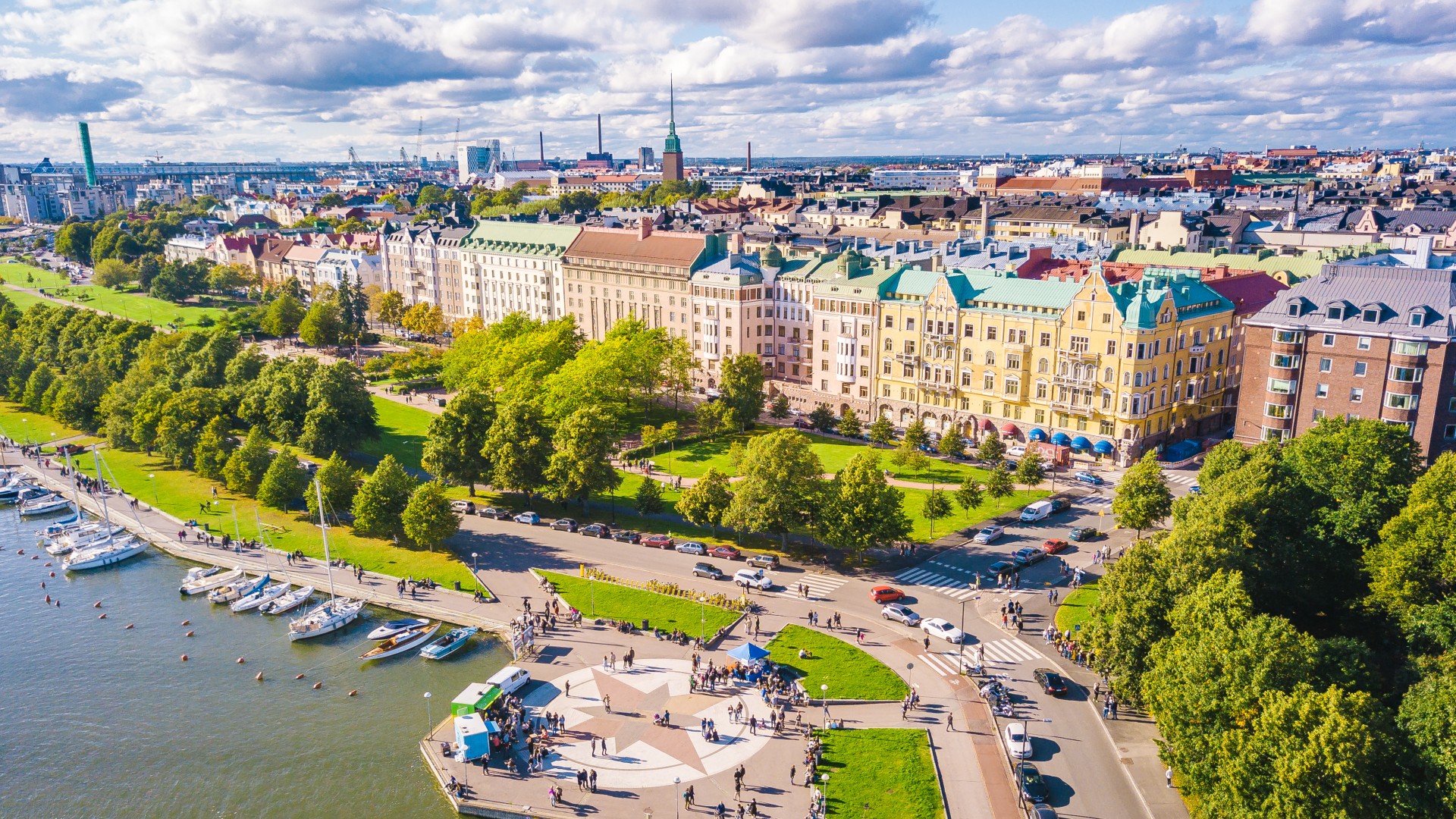How happy is Finland really?
Nordic nation tops global happiness survey for seventh year in a row with 'focus on contentment over joy'

A free daily email with the biggest news stories of the day – and the best features from TheWeek.com
You are now subscribed
Your newsletter sign-up was successful
For the seventh year in a row, Finland has been declared the happiest country in the world.
The Nordic nation and new Nato member topped the ranking of 143 countries and territories in the annual World Happiness Report, released to coincide with the International Day of Happiness (20 March). The UN-sponsored survey, now a publication of the Wellbeing Research Centre at the University of Oxford, asks citizens to evaluate their life and considers factors like GDP, generosity, life expectancy, freedom and trust.
Many Western countries have dropped down the index – in fact, the US has dropped out of the top 20 for the first time since the survey began more than a decade ago. So how did Finland – which infamously had the highest suicide rate in the world in 1990, and now faces the rumbling threat of Putin's Russia on its doorstep – buck the trend?
The Week
Escape your echo chamber. Get the facts behind the news, plus analysis from multiple perspectives.

Sign up for The Week's Free Newsletters
From our morning news briefing to a weekly Good News Newsletter, get the best of The Week delivered directly to your inbox.
From our morning news briefing to a weekly Good News Newsletter, get the best of The Week delivered directly to your inbox.
What did the commentators say?
"Finnish society is permeated by a sense of trust, freedom and high level of autonomy," Jennifer De Paola, a happiness researcher at the University of Helsinki, told DW. The healthy work-life balance, low corruption and a close connection to nature also contributed to the high level of self-reported satisfaction, but there are cultural perceptions at play too.
Finns have a "more attainable understanding of what a successful life is", said De Paola, compared with places where success is measured in wealth.
Finns "enjoy simple pleasures", said VisitFinland – like "clean air, pure water and walking around in the woods". Finland is one of only seven countries whose air quality met World Health Organization standards, according to the most recent IQAir report. And nearly 90% of Finns believe that nature is important in their lives, according to a 2021 survey.
The accessibility of nature "surely plays a part", said Lucy Pearson in The Guardian, with 41 free-to-enter national parks, 647 rivers, nearly 700 miles of shoreline – and "tens of thousands of islands".
A free daily email with the biggest news stories of the day – and the best features from TheWeek.com
But Finns also enjoy more tangible benefits from their strong welfare state, with publicly funded healthcare, free education, smooth-running public services and low levels of crime.
"Research shows that the higher the levels of trust within a country, the happier its citizens are," said Finnish philosopher and psychology researcher Frank Martela on CNBC. "Finnish people tend to trust each other and value honesty." An experiment by Reader's Digest in 2022 tested global honesty by dropping 12 wallets in 16 cities around the world. Helsinki came out top, with 11 of the 12 wallets being returned to the owner.
Finland also boasts one of the lowest levels of income inequality, wrote University of Oxford professor Danny Dorling on The Conversation. In 2023, the highest-paid tenth of Finland's population took home a third of all income (33%) – compared with 36% in the UK, and 46% in the US.
"These differences may not appear great, but they have a huge effect on overall happiness," wrote Dorling, "because so much less is left for the rest in the more unequal countries – and the rich become more fearful."
It's possible the World Happiness Report is "beginning to introduce its own bias", added Dorling. Finns "know why they are being asked the question".
They also say the ranking "points to a more complex reality", said The New York Times. Rather than "happy", Finns were more likely to characterise themselves as "quite gloomy", "a little moody" or "not given to unnecessary smiling" rather than "happy". Many "shared concerns about threats to their way of life", including the rise of the far right, the war in Ukraine and the threat posed by Russia.
The picture is even more complex for minorities. In a population that is more than 90% white, a Black gay man in Finland often feels "that you are the only person in the room", Jani Toivola, the first Black member of Finland's parliament, told the NYT.
What next?
For the fifth year in a row, the UK has slipped down the global happiness rankings, finding itself now at 20th. More concerningly, Brits under 30 ranked 32nd in the happiness rankings, behind El Salvador (a brutal dictatorship).
So what can the UK's youth learn from their Finnish counterparts? Finns "focus on contentment over joy", said Pearson. Lower expectations leave less room for disappointment, meaning that contentment is (more often than not) "well within reach".
"There is a Finnish proverb that seems relevant here," said Dorling: onnellisuus on se paikka puuttuvaisuuden ja yltäkylläisyyden välillä – "happiness is a place between too little and too much".
Harriet Marsden is a senior staff writer and podcast panellist for The Week, covering world news and writing the weekly Global Digest newsletter. Before joining the site in 2023, she was a freelance journalist for seven years, working for The Guardian, The Times and The Independent among others, and regularly appearing on radio shows. In 2021, she was awarded the “journalist-at-large” fellowship by the Local Trust charity, and spent a year travelling independently to some of England’s most deprived areas to write about community activism. She has a master’s in international journalism from City University, and has also worked in Bolivia, Colombia and Spain.
-
 Switzerland could vote to cap its population
Switzerland could vote to cap its populationUnder the Radar Swiss People’s Party proposes referendum on radical anti-immigration measure to limit residents to 10 million
-
 Political cartoons for February 15
Political cartoons for February 15Cartoons Sunday's political cartoons include political ventriloquism, Europe in the middle, and more
-
 The broken water companies failing England and Wales
The broken water companies failing England and WalesExplainer With rising bills, deteriorating river health and a lack of investment, regulators face an uphill battle to stabilise the industry
-
 Scientists are worried about amoebas
Scientists are worried about amoebasUnder the radar Small and very mighty
-
 Europe’s apples are peppered with toxic pesticides
Europe’s apples are peppered with toxic pesticidesUnder the Radar Campaign groups say existing EU regulations don’t account for risk of ‘cocktail effect’
-
 A Nipah virus outbreak in India has brought back Covid-era surveillance
A Nipah virus outbreak in India has brought back Covid-era surveillanceUnder the radar The disease can spread through animals and humans
-
 Is the US about to lose its measles elimination status?
Is the US about to lose its measles elimination status?Today's Big Question Cases are skyrocketing
-
 How space travel changes your brain
How space travel changes your brainUnder the Radar Space shifts the position of the brain in the skull, causing orientation problems that could complicate plans to live on the Moon or Mars
-
 Deaths of children under 5 have gone up for the first time this century
Deaths of children under 5 have gone up for the first time this centuryUnder the radar Poor funding is the culprit
-
 A fentanyl vaccine may be on the horizon
A fentanyl vaccine may be on the horizonUnder the radar Taking a serious jab at the opioid epidemic
-
 Health: Will Kennedy dismantle U.S. immunization policy?
Health: Will Kennedy dismantle U.S. immunization policy?Feature ‘America’s vaccine playbook is being rewritten by people who don’t believe in them’